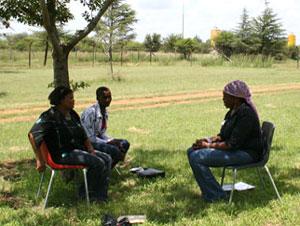HIV infections may be declining in South Africa
BroadReach in Africa (Image: BroadReach Healthcare)
The news out of South Africa this week indicates there’s something for the HIV-stricken country to celebrate. A new report says that HIV infections among young teens are down. In addition, the Western Cape is seeing fewer transmissions because more males are using condoms, and in the last three years the number of HIV infections has stabilized. Is the march of HIV slowing down?
On "The Takeaway," Dr. Ernest Darkoh deconstructs the data.
Dr. Darkoh is the chairman of Broad Reach Healthcare, a group that works to create national Health programs. He was also one of the leading figures in Botswana’s national antiretroviral treatment program, the most successful public sector HIV/AIDS treatment program in Africa.
A recently released report says the number of people infected with HIV has stabilized at 10.9%. Dr. Darkoh explains: "Basically, it means that if you take a snapshot of the population, lets say over the last few years, that snapshot shows that the percentage of people infected has not changed, or has not changed significantly. And so, hopefully, what that means is that we are seeing a decrease in new infections such that those new infections are not keeping the prevalence growing higher and higher."
He thinks the number is accurate: "For example, we’ve always said that there is five point something million people infected in South Africa. If you apply the 10.9% to the current population of South Africa, it is five point something million people who are infected. So that number we’ve always known and it’s not different. In terms of stabilizing, the work done by the HSRC is first class, top notch research and they conducted an excellent survey, probably one of the best in class and I do believe that those results are accurate."
Dr. Darkoh goes on to say that reaching young people is key: "I do believe that the data, the rates in young people are going down. And my belief is based, is more based on more anecdotal things, but it seems that youth are a little bit more responsive to messages. The slightly older age groups for some reason seem quite fixed in their behaviors and a little bit harder to reach. So, if there’s a group that would respond to messages in the same way that youth are quicker at adopting technologies, etc,… right now my three year old knows more about using the DVD remote than I do. I think if there is a change it will come from that group. And by the way, it’s critical that that group does reflect the change because that’s the group that’s uninfected right now – that increasingly becomes infected as they grow older. So, if we are going to break the back of the epidemic we have to have the youth demonstrate that change.
"At the clinical level we would not expect to see any change reflected because, keep in mind, right now in South Africa if we estimate, we have five point something infected people. Out of that five point something million, one million need treatment immediately. And currently maybe we have four hundred something thousand on treatment. So that leaves close to almost six hundred thousand people that need treatment right away and another four million who would need to come through for treatment or care through the pipeline. So actually, we would like to see more people showing up at the hospital at earlier points because currently, the problem we have is currently people showing up when they are on death’s door expecting a miracle and it makes it unsustainable."
A controversial report came out about a year ago from the Harvard Public Health School which said that 330,000 people died needlessly because the Thabo Ambiki government did not take responsibility for HIV and for bringing in enough medication.
Dr. Darkoh believes the actions of some governments contribute to delayed responses in treating HIV: "I can not attest to the actual number because I did not read the methodology behind that report and how they actually calculated that number. What I do believe however, and I think we’ve seen it a number of times particularly on the African continent, we’ve had many situations where certain policies that were put in place, whether, in many cases, well intentioned, I think have contributed in the overall suffering and death from HIV. And I think the stance taken by certain political leadership in this country definitely would have contributed in the delay in the response and therefore I think more death and suffering than otherwise if good leadership and proper sound action been taken much earlier."
The most important way to combat HIV according to Dr. Darkoh is, "Behavior change. People have to change their behavior. HIV is 100% preventable. Nobody has to get infected starting tomorrow, if that choice was truly made and internalized. And therefore, behavior change is absolutely critical; does not require an ounce more funding if people are really able to change their behavior and take control of their own health and realize that they have a lot to do about whether they’ll become infected or not."
"The Takeaway" is a national morning news program, delivering the news and analysis you need to catch up, start your day, and prepare for what’s ahead. The show is a co-production of WNYC and PRI, in editorial collaboration with the BBC, The New York Times Radio, and WGBH.
We want to hear your feedback so we can keep improving our website, theworld.org. Please fill out this quick survey and let us know your thoughts (your answers will be anonymous). Thanks for your time!
